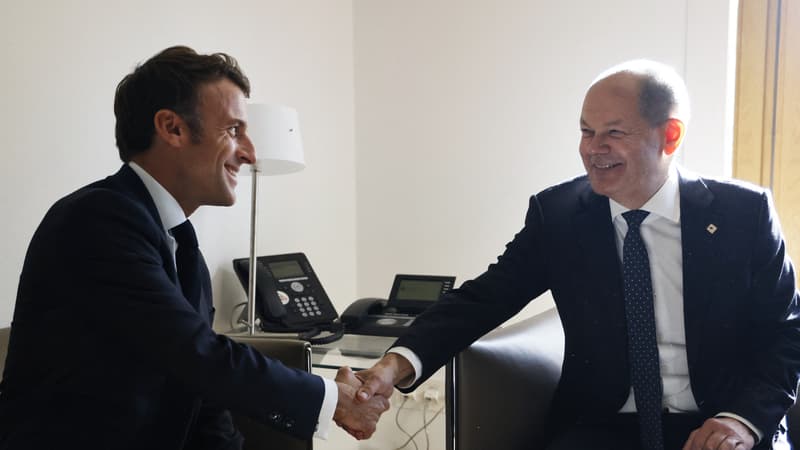French President Emmanuel Macron and German Chancellor Olaf Scholz will try this Wednesday to revive the Franco-German tandem, weighed down by a series of disputes, from energy to defense, in a context of war in Ukraine. During a lunch at the Elysee, the two leaders aim to “strengthen Franco-German cooperation” and respond to common challenges in a “united and supportive manner”, the French presidency summarized on Tuesday.
An ambition that poorly masks the sometimes abysmal differences between the two leading European powers and which led to the postponement for several weeks of a Franco-German council of ministers, the first of Olaf Scholz, scheduled for the same day near Paris.
The Chancellor’s arrival at 12:00 and lunch at 12:35 will not give rise to any statement, neither before nor after, according to the program broadcast this Tuesday night by the Elysee. Regarding the strategy to be adopted in the face of rising energy prices, nuclear energy, European weapons, nothing seems to be going well between Paris and Berlin. Something to worry about in Europe, where the Franco-German engine is still a great engine.
The disputes, especially in various common industrial projects, from the fighter jet to the tank of the future, have been exacerbated since the beginning of the Russian offensive in Ukraine.
“A Marriage of Necessity”
Germany, among the most affected by its dependence on Russian gas, has undertaken “a change of model whose destabilizing nature should not be underestimated”, analyzes Emmanuel Macron.
Chancellor Scholz announced a plan of aid of 200,000 million to individuals and companies in the face of rising prices, in particular of gas after the cuts in deliveries imposed by Russia. This plan, launched without consulting its European partners, has caused great misunderstandings and fears of distortion of competition in Europe.
After decades of underinvestment, Germany has also made a defense U-turn to make its military “the best-equipped force in Europe.” Again without necessarily working to reinforce the European strategic autonomy advocated by Paris and even less to that of Franco-German military-industrial cooperation.
Berlin is thus promoting a project for a European anti-missile shield, with a particularly Israeli component, which competes with that of Paris and Rome. For many observers, this rupture is inherent in any relationship in which European ambitions and national interests intertwine, but it is not necessarily prohibitive.
“Coordinate Efforts”
“Macron Merkel, they exchanged text messages every day, and there, I don’t think they speak every day,” he points out again. On Europe, the two leaders have “a lot of convergence”, although the chancellor said little about France in her speech in Prague on the European Union at the end of August, she stands out in Paris.
Olaf Scholz then pledged to support an eastward enlargement of the European Union and an EU with “30 or 36 members”, a much more proactive approach than France’s. But he also advocated, like Paris, for the passage to the qualified majority of a certain number of European decisions, from foreign policy to taxation. In Berlin, we prefer to relativize.
We in Brussels also want to believe it. “I am confident in the determination of both the French president and the German chancellor” to “work together”, assures the president of the European Council Charles Michel.
Source: BFM TV


